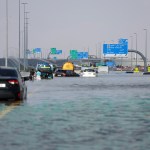“Today we are at media houses to try and raise awareness about the climate crisis and how they are not reporting sufficiently on the crisis. We are trying to let people know that this a big crisis and it is deepening inequalities in poor communities,” said Jane Cherry the executive manager of Co-operative and Policy Alternative Centre (COPAC).
COPAC and its alliance partner the South African Food Sovereignty Campaign (SAFSC), organised the mass action which was held on Monday and kicked off at the Times Media Group, before heading to the South African National Editors Forum and the Press Council.
Chairperson of COPAC, Vishwas Satgar said they had organised for drought affected communities to come and share their lived experiences with the media.
Communities that were represented came from the Western Cape, Eastern Cape, Mpumalanga, and Limpopo.
“The issue for us is that the media really has to report on the science of climate change. It must talk to the policy challenges, and it must really inform our public about the systemic alternatives that are there coming from grass roots movements and communities to solve these problems,” Satgar said.
He insisted that climate change was a complex problem that has been created by us and our reliance on fossil fuel extraction and addiction to carbon despite there being better alternatives such as socially owned renewable energy.
“Globally 40% of carbon emissions come from agriculture but if we transition to a food sovereignty system, immediately we can have a massive effect,” he said.
Food sovereignty is an idea that was initiated by La Via Campesina, a large social movement with over 200-million members. Since 1996 it has opposed the food security framework arguing that it is simply not working, that is has become a carbon-centric food system from the way food is produced and traded across the world
The alternative, according to La Via Campesina, grants small scale producers and consumers control over the food system. It is locally embedded, it is culturally appropriate, healthy, and localised food. It requires a food system that is based on a science of agroecology that sequesters carbon and affirms biodiversity and cultural heritage and is a system that is more water efficient than other kinds of farming.
“We have over a billion people hungry, 2.3-billion food insecure, over 2-billion people obese, so the globalised fossil fuel system is actually a toxic food system,” Satgar said.
According to Satgar, food sovereignty as a system was irrefutably the most cost-efficient food system as it did not involve dealing with inputs from corporations but instead pioneers working with biodiversity.
“Being locally embedded, your carbon footprints are almost zero because you can sell a site to a community or directly to a local farmer market. So, it’s a proven solution and that’s what we are fighting for in the South African context,” Satgar said.
Nosintu Mcimeli, a resident from eNgqamakhwe in the Eastern Cape, said her community had been brutally hit by the drought. She said for three years there had been hardly any rain, taps had turned into ornaments while dams ran dry and it was affecting their households.
“If my husband comes home and there’s no food because I don’t have a garden for vegetables to feed our children, he hits me, he says I’m lazy,” she said.
Mcimeli said they must walk long distances to the Xilinxa dam and because she is physically disabled, she cannot walk to the dam. She was now forced to use her children’s grant money to pay someone to fetch water for her with a wheelbarrow.
“It’s so sad and the money is not even enough to feed us,” she said.
Mcimeli said she was particularly saddened by how the disabled and mentally ill were affected by the drought.
“There are disabled people who are bedridden, some sitting in wheelchairs and they can’t be cleaned because there is no water,” she said.
Thembakazi Peter, a resident of Mount Frere and member of Farmers Network (NGO) said that in her village of Elubhacweni in the Eastern Cape, they were also challenged with water scarcity. Peter said the small amount of water available had to be shared with livestock and they must use the same dirty water to quench their thirst and do their laundry.
“For nine years we have not known of clean water. So far, we don’t get any clean water unless it is raining and only then do we manage to collect water with buckets. Some of our farmers managed to buy themselves water tanks,” she said.
Adam Mabunda from the Inyanda National Land Movement and Mopani Pharmacy Association in Giyani, Limpopo says the rural areas have lost their serenity and people are becoming desperate.
“Villages used to be very peaceful areas. As we speak now the degree of crime in villages is so high. People are hungry and have no other means, so they resort to crime to make a living,” he said.
Philip Machenick, a lecturer at Rhodes University and chairperson of the Grahamstown Residence Association was invited by COPAC and SAFSC to be a part of the gathering.
The association has seen a growing membership of township residents.
“We have been very active in alerting the public about the growing water crisis in Makhanda,” he said.
He said wealthier residents were able to buy their way out of the crisis by putting in rain tanks, buying bottled water and so on. But the poor must queue for hours in the sun for water from an aid organisation, Gift of the Givers, with no communication of when to expect water.
“Infrastructure projects are failing all over the country because it seems that the politicians and senior government officials only care about fuelling their patronage networks and not getting the projects done,” Machenick said.
Abeedah Adams of the Water Crisis Coalition in Cape Town said that at the height of the drought last year the city implemented what they called a punitive water tariff.
Executive Director of SANEF, Kate Skinner, who accepted a memorandum from the activists, advised them to not only focus on print media but to also include the broadcast media such as SABC radio, community radio stations and online publications.
She proposed a discussion involving editors from various publications where all the information would be put on the table and all the details discussed in depth.
“I am very happy to take this forward. I will send this to all our members, and we can take it from there,” she said.
Executive Director of the Press Council, Latiefa Mobara said that they support freedom of the press, and while she would relay COPAC’s demands to other members of the Press Council she could not guarantee publication as that was not the council’s role.
The editor of the Sunday Times was not available to address the activists.
In its memorandum COPAC said they had submitted an article on the climate crisis to the Sunday Times, and claim article was rejected. They claim no reasons were provided for this, hence they decided to start their picket there.
Among the list of demands handed over to media representatives were a call to:
- end climate change denialism in the media. To inform the South African public about the science of climate change and the importance of climate policy that promotes climate justice;
- report on the ongoing drought and other extreme weather conditions;
- highlight direct connections between failing water supply, corruption and maladministration in many of these situations;
- provide coverage of climate change struggles; and
- empower citizens and our democracy to deliberate on the existential. challenges and transformative solutions we require to confront the climate crisis. DM



















 Become an Insider
Become an Insider